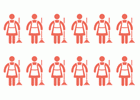41 - 60 of 84 Results
Pagination
Date:
Violence against women and girls manifests itself in physical, sexual and psychological forms. Learn how.
Date:
A sudden or gradual change in appearance or behaviour can be an indicator that abuse or neglect has occurred (or may still be happening). Learn more about the signs of relationship abuse.
Date:
Climate change affects everyone, but it’s the world’s most vulnerable who bear the brunt of environmental, economic and social shocks.
Date:
Think you know your facts on women and climate change? Take our quiz to find out.
Date:
During times of instability, women and girls are disproportionately impacted by sexual and gender-based violence. This interactive infostory explores the various paths to justice, gives voice to survivors’ stories and looks at the critical role investigators play in ending impunity for sexual and gender-based violence crimes. View more >>
Date:
Think you know your facts on today’s 1.1 billion girls? Take our quiz to find out.
Date:
Armed conflicts. Earthquakes and storms. Deadly disease outbreaks. Such crises destroy human lives and communities with striking regularity. Each year, they hit dozens of countries in every region of the world, sometimes with no warning at all. Women and girls are among those most vulnerable to the consequences — and most vital to recovering from them.
Spotlight on Sustainable Development Goal 5: Achieve gender equality and empower all women and girls
Date:
Gender equality and women’s empowerment is integral to achieving the Sustainable Development Goals (SDGs). This thematic spotlight is part of a series showcasing where women and girls stand against select SDG targets and was produced in support of the High-level Political Forum on Sustainable Development at UN Headquarters in New York from 10–19 July, 2017.
Date:
The health of our oceans is declining. This threatens the lives, livelihood and food security of billions of people. For island communities and those living around oceans and seas, the risk are even greater. Recently, UN Women visited the island nation of Seychelles, in the Indian Ocean Rim region, where ocean-based tourism is the backbone of the economy and men and women rely on the ocean for sustainable living. Women are also leading marine conservation and sustainable use of the ocean in Seychelles. This photo essay provides a glimpse into their efforts and impact.
Date:
Indian Ocean Rim countries have set change in motion, investing in laws, policies, and institutions that empower women economically. But there’s much to be done. From the gender pay gap to labour policies, dive into the data to see how women fare across the region.
Date:
Finding women at work shouldn't be this hard. To highlight women's under-representation in science, technology and politics, UN Women Egypt and DDB Dubai launched the "Finding Her" initiative. The series of illustrations show science, technology and political workplaces with only one woman.
Date:
The world of work is changing fast, through innovation, increasing mobility and informality. But it needs to change faster to empower women, whose work has already driven many of the global gains in recent decades.
Date:
Globalization, digital innovation and climate change, among other factors, continue to change the world in which we work — posing both challenges as well as opportunities in realizing women’s economic potential for a better tomorrow. Explore just some facts on where women stand today in the changing world of work.
Date:
Think you know your facts on women and the economy? Take our short quiz to find out!
Date:
Rural Liberian women are promoting renewable solar energy that reduces dependency on expensive and polluting fossil fuels, like kerosene.
Date:
From the conviction of a Congolese warlord for crimes against humanity to Argentines taking to the streets to protest femicide to emojis getting a gender boost, this timeline is a selection of some of the gender equality achievements, milestones and lighter noteworthy moments from around the world this year.
Date:
In Cambodia, 70 per cent of women are engaged in vulnerable employment; more than 500,000 work in garment and footwear factories. Empowering women to exercise their rights to decent work, UN Trust Fund to End Violence against Women (managed by UN Women on behalf of the UN system) is working closely with partners to ensure discrimination-free work environments in Cambodian factories.
Date:
UN Women originally presented these images from the archive of renowned photography agency Magnum Photos at the launch of the Global Study on the Implementation of Security Council resolution 1325 in 2015, to mark the 15th anniversary of UN Security Council resolution 1325 (2000), which recognized the critical importance of women’s participation in peacemaking and peacebuilding.
Date:
In the past two decades, an annual average of 172,000 Filipino women have left the country as migrant workers, in the quest for decent work and adequate income.
Date:
Migrant domestic workers contribute to the economic and social wellbeing of societies both in their host and home countries, and yet are among the most vulnerable groups in the workforce and face a number of human and labour rights abuses. Learn the facts.

















